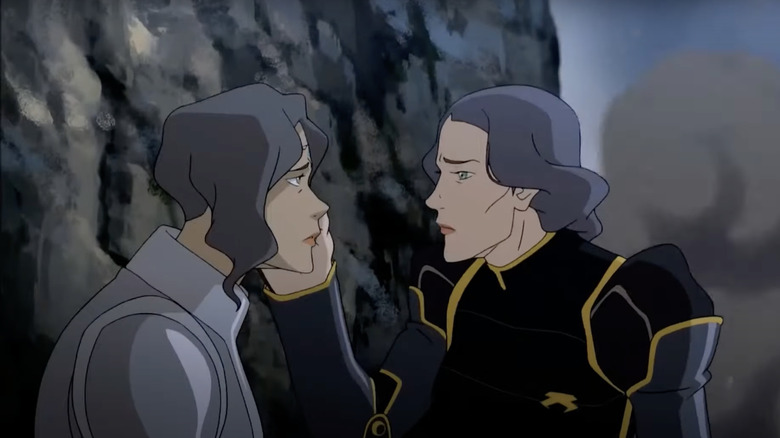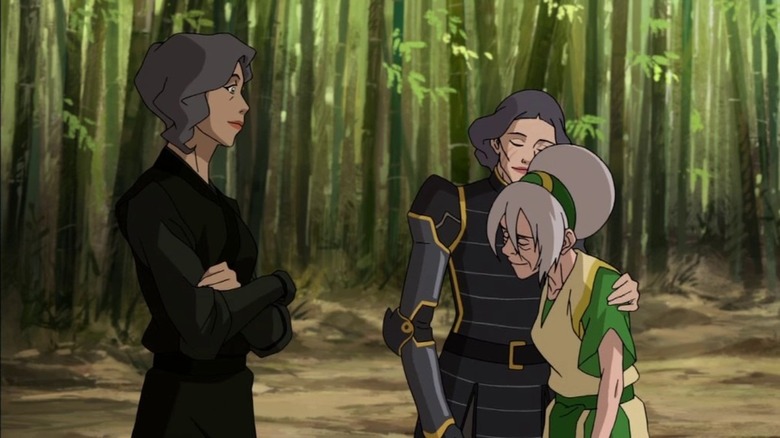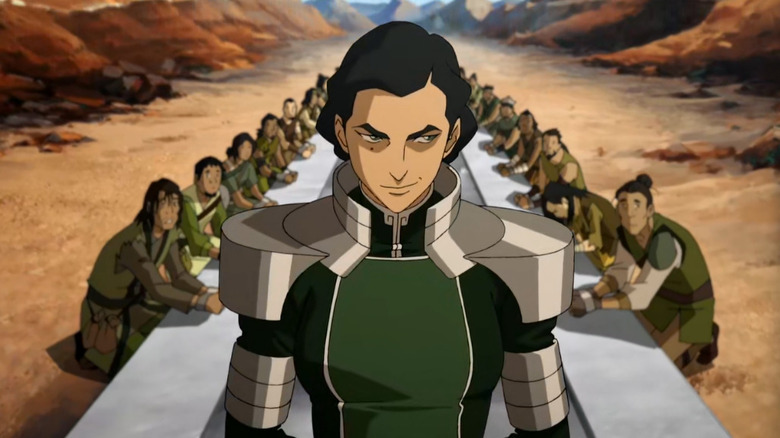How Anne Heche's Role In The Legend Of Korra Made The Show Even Better
As a sequel to "Avatar: The Last Airbender," "The Legend of Korra" started off with big shoes to fill. The series didn't always walk the straightest path in these shoes. "Book 1: Air" is rock solid but underserved by its breezy 12-episode run. "Book 2: Spirits" is entertaining but a structural mess. However, seasons 3 and 4 overcame the growing pains and delivered an experience as incredible as "The Last Airbender" at its best.
One area where "Korra" never faltered was its voice cast. Comedian Janet Varney was perfect as Korra, imbuing the young Avatar with both spunk and self-doubt. There were also plenty of big names in the cast: J.K. Simmons as Korra's mentor Tenzin (the son of previous series' heroes Aang and Katara), Bruce Davison as an aged Fire Lord Zuko, Aubrey Plaza as the goth waterbender Eska, and Spike Spiegel himself Steve Blum as Amon, the masked villain of season 1.
The late Anne Heche played Suyin Beifong, a metalbender extraordinaire and the daughter of the fan-favorite Toph. Debuting in "Book 3: Change," Heche's performance left a mark on the series and helped turn "Korra" into the stronger show it became during its second half.
Suyin Beifong, the Metal Queen
Team Korra first meets Suyin in season 3, episode 5, "The Metal Clan." After the events of the previous season, new Airbenders are popping up all across the Earth Kingdom; one of them is Suyin's daughter, Opal. Suyin, her family, and their disciples live in a private city called Zafou built entirely from metal. As metalbenders, the entire city is their weapon. Suyin is hospitable, but there's also no doubt of her authority. Anne Heche also does a marvelous job walking the line between confidence and arrogance; Suyin's not a bad person, but her power and secluded lifestyle have made her complacent.
A show will have settled into a groove by season 3, and introducing new characters risks disrupting dynamics. Instead, Suyin's presence furthered what "Legend of Korra" was already about. During "Korra," the "Avatar" world is in the midst of an industrial revolution, and the show asks whether bending or the Avatar are still needed. Zaofu, the pinnacle of technological development, presses the themes further.
Then there's her relationship with her older half-sister, Lin (Mindy Sterling). Lin was a main character on "Korra" from the beginning, but during the first two seasons, she was a pretty typical cranky police chief. The only reason offered for this was her breakup with Tenzin years earlier. Suyin's introduction allows the show to explore Lin's past and bring her needed depth.
Suyin was a delinquent in her youth and accidentally scarred Lin when her sister tried arresting her. Thus, the Beifong sisters haven't spoken in years. Despite her guilt, Suyin isn't the type to dwell on the past. The bitter Lin, however, refuses to see that the Suyin who she's mad at doesn't exist anymore. Their frustrations eventually boil over into a metalbending duel.
Toph's return
After their fight, Lin and Suyin manage to patch things up and fight alongside each other in the season's climax. However, it's not until "Book 4: Balance" that they confront the source of their problems: their mother, Toph. When we met Toph in "The Last Airbender," her parents were overprotective due to her blindness and practically kept her prisoner in their home. Toph didn't want to repeat that mistake and was a laid-back parent, giving her children too much freedom. That's why the sibling rivalry festered and why Suyin almost went down a bad path.
"Legend of Korra" was wisely sparing when it came to cameos from old fan favorites. Still, Toph's was the best and most substantive. She gets plenty of hilarious lines, mostly at Korra's expense, courtesy of the late Philece Sampler. She may be older and wiser, but she's still a trickster.
Season 4's 10th episode, "Operation Beifong," finally brings mother and daughters together and settles old wounds. It had been established that Lin became the chief of the Republic City police, just like Toph was, to make her mother proud. Toph makes sure both her children understand she is indeed proud of them both.
Unfortunately, Suyin's presence in the show didn't just portend the arrival of old friends, but also new enemies.
A new villain
"The Legend of Korra" had a new villain each season. Each followed a different ideology: Amon was an "Equalist" who saw bending as the root of all evil, while season 3 villain Zaheer (Henry Rollins) was an anarchist who wanted a world without governments. However, each villain's goal is to usurp Korra's role as the world's protector; season 2 villain Unalaq (Adrian LaTourelle) even becomes a literal "Dark Avatar."
Season 4's villain, Kuvira (Zelda Williams), combines this with the show's aforementioned themes of industrialization. The leader of the upstart "Earth Empire," Kuvira builds a military dictatorship and says technology is the key to progress. She even harnesses energy from the spirit world into a laser-like weapon. In Kuvira's world, technology literally subjugates mysticism.
As for the hero and villain being foils, Korra literally sees her reflection give way to Kuvira's visage in the finale, "The Last Stand." However, Kuvira has another key relationship, with Suyin. Kuvira is a former member of Zafou and Suyin's protégé. Suyin's son Baatar even becomes Kuvira's right hand (and fiancé). Kuvira's rebellion was in part because she resents how Suyin never used Zaofu's advances to help the world, instead just carving out a private utopia. Suyin is thus forced to confront her own faults as a parent, the latest curve in a never-ending cycle.
Movie stars don't usually give their best performances with voice acting. Anne Heche as Suyin Beifong, though, elevated an already well-written character.



